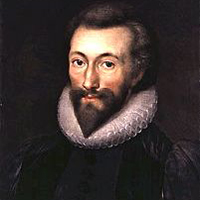The Canonization by John Donne: Summary and Critical Analysis
The word 'Canonization' means the act or process of changing an ordinary religious person into a saint in Catholic Christian religion. This title suggests that the poet and his beloved will become 'saints of love' in the future: and they will be regarded as saints of true love in the whole world in the future.

John Donne (1572-1631)
The speaker of the poem is an old man who has just got the good luck of having a young beloved! But, unluckily, he is being disturbed by a man who comes to a place where he is making love. This intruder (one who disturbs) seems to have told him not to do like this. The old lover gives energy to reply to him. Donne's "Canonization" is an example of metaphysical poetry. It uses conceits, allusions from the medieval philosophy of metaphysics, a dramatic situation and an impassioned monologue, a speech-like rhythm, and colloquial language, all of which make it a typical "metaphysical" poem.
The personal in the poem speaks about the transformation of worldly lovers into holy saints as in the Catholic Christian custom of 'canonization'. The speaker in the poem claims that he and his beloved will be canonized when the poet immortalizes their love, and that lovers of the future will invoke to them to give them the strength of spiritual love. The physical passion is to unite them into one soul and transform them into saints of love.
The poem takes the form of a drama where the speaker is speaking back with angry arguments against a third person who seems to have told him not to indulge in such love affair in old age! The speaker argues with the intruding stranger so as to justify his metaphysical logic of love. As the argument develops, the comparison of the relation between lovers develops with other metaphors of myth, religion and so on. The speaker equates worldly human love with the ascetic life of unworldly saints. The whole poem can be seen as an extension of the central unusual comparison of the canonization of a lover! The poem makes an impressive beginning with an abrupt jump into the situation: 'Hold your tongue and let me love.' The lines are highly dramatic. They illustrate the shock tactic used in most of Donne's metaphysical poems.
The argument in the poem is forceful, suggestive and witty. The speaker uses colloquial words, rough idioms and broken rhythm, all of which characterize metaphysical poems. The very beginning "For God's sake....." is a good example. The whole poem is in such shockingly new language and rhythm. Though the rhythm is rough and conversational, the poem is written mainly in iambic pentameter. Each of five stanzas is of nine lines, and a rhyming scheme such as: abbacccaa. But the word loves is, for some reason, always used in slant rhyming as in love/ approve, love/ improve, etc.
Use of surprising registers (words) is another feature of the poem. The speaker uses words from the register of trade, commerce, medicine and myth so as to elaborate his concept of metaphysical love. 'Palsy' and 'gout' for instance belong to the register of medicine while 'merchant' and 'ship' signify the realm of trade and commerce. While 'Phoenix' relates to myth, 'hymns' concerns religion and 'chronicles' means 'history'.
'Canonization' links together disharmonious images. In other words, there is 'a yoking together of heterogeneous images by violence'. As the speaker faces an intruder and argues with him, he links 'lover's sigh' with 'merchant's ships', 'colds' with 'spring', 'heat' with 'plague' and 'love songs' with divine hymns. As the argument proceeds, the comparison of the relation between lovers moves from the register of trade and myth to a climax where true lovers are equated with canonized saints.
Fusion of emotion and intellect is another important feature of the poem. The fusion is observed in the comparison of the lovers to the mysterious phoenix and the divine saints. The speaker assumes that like the phoenix, the lovers would 'die and rise at the same time' and prove 'mysterious by their love'. Reference to this mythical being well sums up Donne's theory of sexual metaphysics; a real and complete relation between a man and a woman fuses their soul into one whole. The poet is both sensuous and realistic in his treatment of love. The romantic affair and the moral status of the worldly lovers are compared to the ascetic life of unworldly saints.
The poem uses an elaborate conceit. In the beginning the speaker expresses his commitment to love. He addresses an intruding stranger and warns him to keep out of the lover's way. Next, he discusses love in terms of 'sighs', 'cold' and 'heat'. In the lines that follow, the poet uses more and more of disharmonious associations. He equates lovers to 'flies' and 'tapers', 'Eagle' and 'Dove', 'Phoenix' and 'saints'.
Thus, 'canonization' is in many ways a typical metaphysical poem where the complexity of substance is expressed with simplicity of expression. The general argument and its development are clear like its dramatic situations. The allusions are sometimes too forced, but that is a part of such poetry.
Cite this Page!
Sharma, K.N. "The Canonization by John Donne: Summary and Critical Analysis." BachelorandMaster, 11 Nov. 2013, bachelorandmaster.com/britishandamericanpoetry/the-canonization.html.
